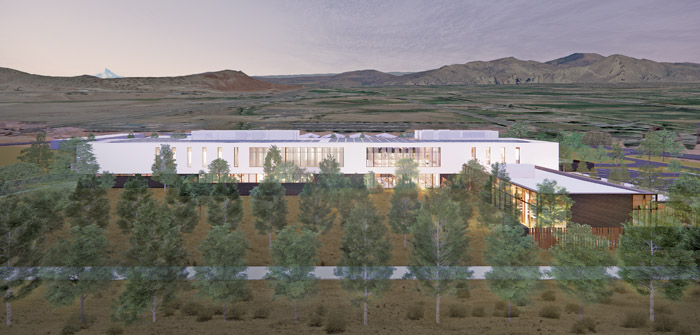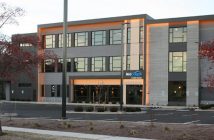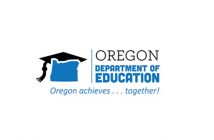(A rendering of Redmond’s new Public Safety Facility that is slated for completion next summer | Rendering courtesy of the City of Redmond)
“It has been nonstop” this past year,” said City Manager Keith Witcosky, with “a lot of initiatives that need to get done. But our really ambitious city council has a strong appetite for making things happen commensurate with Redmond’s growth, an approach that has been fantastic in moving these initiatives forward.”
With an annual growth rate of 5.31%, Redmond has seen its population increase by 16.8% since 2020, or by more than 38.8% (10,000 people) since 2015. Portland State University’s population research center estimates that this figure will burgeon from almost 38,000 in 2024 to around 60,000 by 2047.
Or as Urban Renewal Program Manager Chuck Arnold put it, “Redmond’s growth rate is close to a family of three or four moving in every single day, or 1,000 people a year.”
While acknowledging that “it’s a good thing to be in a healthy, growing city,” Witcosky acknowledged that with this growth come planning challenges such as affordable housing, transportation improvements, and water availability. Fortunately, the mindset of our seven-member council is to be as proactive as possible. And they’re willing to take calculated risks.”
“Aiding this mindset is the fact that Redmond is smaller in size, which makes it easier to get decisions made, as opposed to a larger city where there are so many more stakeholders. We can move faster.” (He drew an analogy: “What takes six months here would take 18 months in Portland,” where Witcosky’s extensive government experience includes heading the Portland Development Commission).
“Redmond still has the opportunity to be nimble as it matures and evolves,” agreed Urban Renewal Program Manager Chuck Arnold, “and there are many great things happening here.”
“Staying Ahead of the Game”
“We’re staying ahead of the game on things we can control, such as city services that everyone uses,” Witcosky said. These include development of an $83 million Redmond Wetlands Complex for municipal wastewater treatment and reclamation (He noted that “it will give us an incredible opportunity to expand the capacity of wastewater treatment while also creating sustainable assets for the community, lifting the ceiling so Redmond can continue to grow.”); and expansion of Redmond Municipal Airport, which is owned and operated by the city, and whose passenger numbers have doubled since 2016.
In addition, a new 42,000-square-foot, two-story Public Safety Facility will replace the existing home of the Redmond Police Department that, according to Witcosky, ”was built 25 years ago, and is completely obsolete.” With a project cost capped at $49 million (Redmond voters approved a $40 million bond in May 2022 to finance construction), the new facility — located on Northwest Canal Boulevard — is slated to open next summer.
“We’re Not Fully in Control of Funding”
Redmond’s city manager since 2013, Witcosky has seen how traffic demands have increased in a very short period of time. “As the hub of the fastest-growing region in the state, our area is desperately behind in transportation infrastructure,” he said. Traffic congestion is becoming the norm, and safety challenges continue to increase.”
Witcosky pointed out, however, that “we’re not fully in control of funding” for major capital projects such as transportation system improvements, despite “having great legislative delegations at both the state and federal levels working on our behalf.”
As an example, “the intersection at 35th and Highland is not safe, and will become increasingly dangerous as Redmond continues to grow, and the new Parks and Recreation Center opens nearby — which is expected to bring in thousands of daily users. It’s a ‘rubber meets the road’ situation,” he said.
“But putting in a traffic signal there will require $2 million, and a partnership with ODOT, which is grappling with a projected budget shortfall of more than $354 million over the next few years, and focusing its efforts primarily on maintenance as a result.”
Basically, Witcosky said, “the agency doesn’t have the money, so we either have to come up with all of the funding for this project, or a significant share of it.” According to Mayor Ed Fitch, “We’ve dedicated about $500,000 to $600,000 that can be used for that light, but need ODOT to pay for the difference.”
Witcosky also cited the intersection of Helmholtz Way and Hwy. 126 on the edge of the city limits, where the city has urged ODOT to construct a roundabout to slow traffic down and make it safer for people coming across. The price tag for that project has been estimated at $5-6 million, “which the state doesn’t have.”
And there’s more. Witcosky noted that Redmond has other transportation projects that would require buy-in from ODOT and/or Deschutes County. Among them, “we need to figure out more opportunities to move vehicles across U.S. 97, and develop routes that alleviate further congestion without cutting through the heart of the city.”
“The Key Is Finding Partners”
In addressing Redmond’s priorities — whether transportation and transportation funding, stimulating construction of affordable housing, or creating jobs with family wages — Witcosky is adamant that “the key is finding partners.”
On the housing side, where three or four projects are underway, “housing stock is increasing by about 500 single-family and multi-family units annually. We’re seeing steady development, and staying pretty solid,” he said.
REDI and EDCO are working with the city “to create more jobs in the area with family wages, recognizing that we have to pull up housing overall, not just build affordable housing,” in Witcosky words. These sentiments are echoed by a member of the city council, who said that “Redmond needs to balance affordable and workforce housing with market-rate housing, creating communities for all income levels.”
A “Synchronized Culture”
Witcosky, called “a thoughtful and strategic leader who understands the need for collaboration” by his colleagues, revealed another key to Redmond’s success is getting things done. The city hall staff “is phenomenal,” he said, “prepared, thorough, and informed — at the top of their game. The Council has incredible trust and confidence in how they work and the synchronized culture we have, and takes a lot of pride in moving things forward. That’s how you get results — and that’s why Redmond is what it is.”





